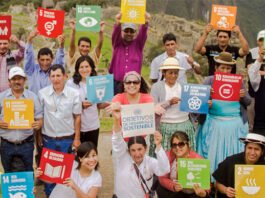Introduction to the International Day for the Eradication of Poverty
The International Day for the Eradication of Poverty is observed annually on October 17, marking a significant global commitment to addressing the multifaceted challenges posed by poverty. This day serves as a platform to promote awareness, stimulate action, and encourage dialogue among governments, civil society, and individuals. Established by the United Nations General Assembly in 1992, the day aligns with the broader goal of eradicating extreme poverty, contributing to the 2030 Agenda for Sustainable Development.
A defining characteristic of the International Day for the Eradication of Poverty is its thematic focus, which evolves each year to reflect pressing issues related to poverty. For 2024, the theme emphasizes the importance of social and institutional responsibility in combating poverty. This focus encourages global leaders, policymakers, and community stakeholders to collaborate in addressing not only the economic aspects of poverty but also the social injustices that exacerbate inequalities within societies. The theme underscores the notion that poverty is not merely a lack of financial resources; it is also a manifestation of social exclusion and institutional neglect.
The role of the UN Secretary-General in this context is pivotal, as they consistently advocate for policies that prioritize the needs of the most vulnerable populations. By mobilizing support and resources, the Secretary-General plays a vital part in shaping international efforts to end poverty. The International Day for the Eradication of Poverty thus highlights the collective responsibility of global leaders: to recognize and act upon the interconnectedness of poverty, social injustice, and institutional maltreatment. Every effort counts towards reclaiming dignity for those affected by poverty, making it essential to raise awareness and foster solidarity on this critical issue.
Understanding the Nature of Poverty and Discrimination
Poverty is a complex and multi-dimensional issue that affects millions of people globally. It transcends mere financial deprivation, as it encompasses social, economic, and political dimensions that collectively contribute to the realization of human rights. According to the World Bank, approximately 689 million people live on less than $1.90 a day, highlighting the urgent need to address poverty not only as an economic concern but as a societal crisis. Individuals facing poverty often encounter systemic barriers that exacerbate their struggles, such as limited access to education, healthcare, and employment opportunities.
Discrimination plays a significant role in perpetuating poverty. Marginalized groups—including women, racial and ethnic minorities, and persons with disabilities—frequently find themselves trapped in cycles of inequality. For example, studies indicate that women, despite being key economic contributors, are overrepresented in low-wage jobs and often face wage disparities compared to their male counterparts. This systemic discrimination impedes their ability to escape the clutches of poverty.
Personal narratives also illuminate the harsh realities of living in poverty. Consider the story of Maria, a single mother struggling to provide for her children. Despite working two jobs, she remains unable to afford basic necessities due to low wages and rising living costs. Her experience reflects a broader trend where systemic inequalities intersect with poverty, creating a compounded effect that challenges individual resilience and agency.
Statistics and personal stories together underscore the need for a comprehensive understanding of poverty and discrimination. Efforts to combat poverty must recognize that it is interlinked with various forms of discrimination and systemic barriers that sustain inequality. Only through a collective understanding of these issues can we begin to formulate effective solutions to eradicate poverty and institutional maltreatment on a global scale.
The Role of Governments in Eradicating Poverty
Governments play a crucial role in eradicating poverty, given their ability to implement policies and programs that directly affect the economic and social well-being of their citizens. One significant responsibility of government is to shape inclusive institutions that prioritize the needs of vulnerable populations. This requires a comprehensive understanding of poverty’s multidimensional aspects, as well as an unwavering commitment to addressing its root causes.
A ‘people first’ approach is essential for these efforts, where policies are designed with the objective of enhancing the welfare of individuals and families living in poverty. Governments must invest in decent work opportunities that offer fair wages, job security, and dignity for all workers. Creating job-enhancing programs can assist marginalized communities in securing sustainable livelihoods, which is pivotal in breaking the cycle of poverty.
In addition to employment-focused strategies, investment in quality education is imperative. Education empowers individuals with the skills and knowledge necessary to improve their economic circumstances. Furthermore, governments should strive to provide access to affordable and quality education, particularly for children from low-income families, ensuring that educational opportunities are equitable and accessible.
Social protection programs also form the backbone of an effective poverty eradication strategy. These programs must target those most at risk, providing essential services such as healthcare, housing, and food security. By implementing safety nets that support families in times of need, governments can create pathways out of poverty, thereby fostering resilience among the most marginalized groups.
By focusing on inclusive growth, investing in human capital, and fostering social protection systems, governments can take significant steps toward eradicating poverty. Actions taken at the governmental level have the potential to foster environments where all individuals can thrive, ensuring that poverty is not merely a statistic, but a challenge we address with urgency and compassion.
A Call to Action: Committing to End Poverty Together
The eradication of poverty is a formidable challenge that requires an unwavering commitment from all sectors of society. Governments, local communities, and global stakeholders must unite in dedicated efforts to address this deep-rooted issue. The interconnected nature of modern challenges necessitates collaborative action to ensure that every individual can thrive without the constraints of poverty. By empowering developing countries through initiatives like the Sustainable Development Goals (SDGs), we lay the groundwork for equitable growth and opportunity.
Innovative financing mechanisms and reforms in the financial architecture are essential steps towards achieving sustainable development. These reforms must prioritize support for vulnerable populations, fostering environments where everyone can access education, healthcare, and economic opportunities. Enhanced global cooperation will amplify our ability to mobilize resources efficiently, ensuring that aid reaches those who need it most.
Furthermore, engaging communities at a grassroots level is crucial. Community leaders can serve as catalysts for change by advocating for policies that prioritize poverty alleviation and by organizing local initiatives aimed at improving living standards. These local actions, supported by national and international frameworks, can significantly contribute to poverty eradication efforts.
Additionally, individuals and organizations alike can champion this cause by adopting practices that promote equity and inclusion. This might include supporting local businesses, volunteering time and resources, or advocating for policy changes that address systemic inequalities. Corporations can also play an essential role by integrating social responsibility into their business models, helping to create sustainable livelihoods and contributing to community well-being.
In conclusion, the fight against poverty is a shared responsibility that demands our collective action and dedication. Together, through concerted efforts and unwavering commitment, we can build a future where all individuals are afforded the dignity and opportunity they deserve, leaving no one behind in the quest for prosperity and justice.




